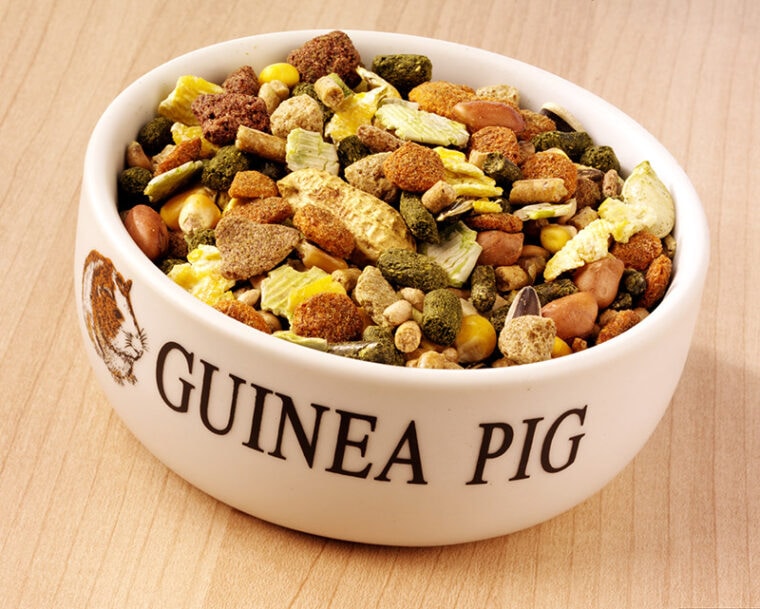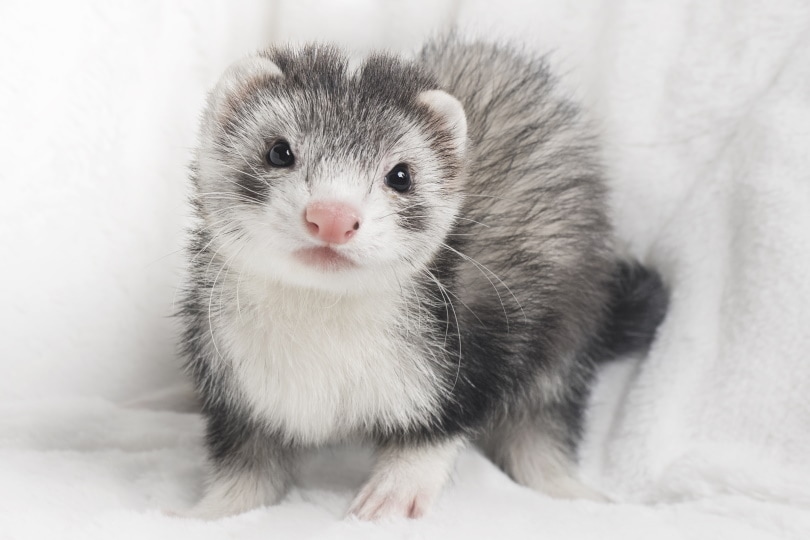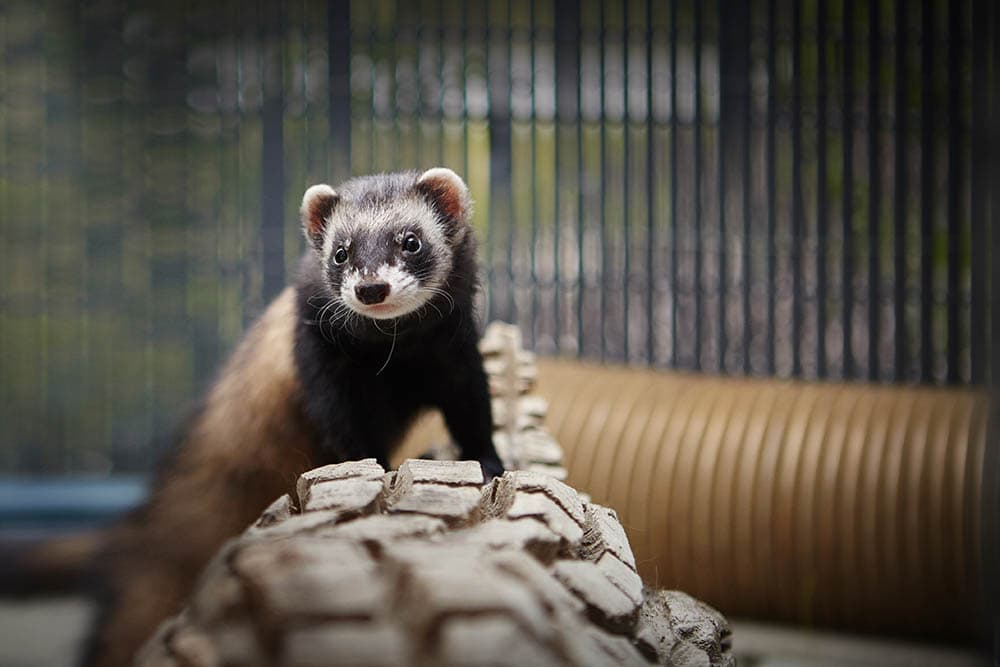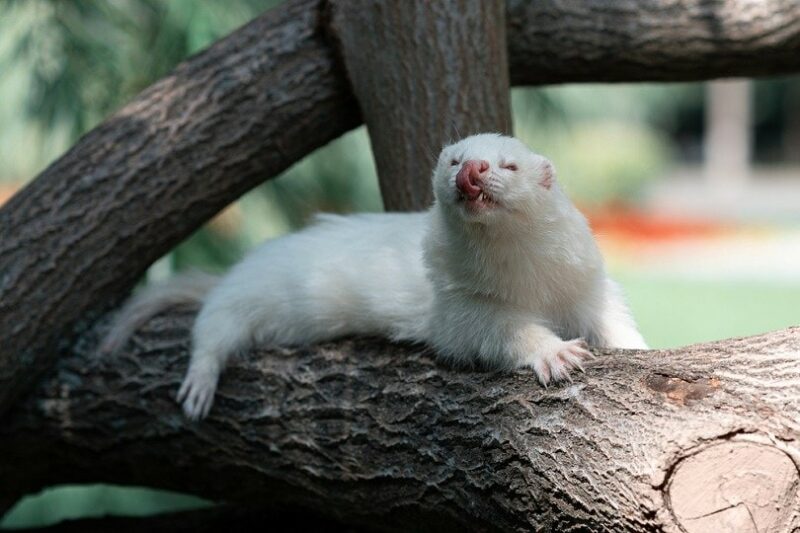
Ferrets and guinea pigs are two common critters kept as pets in a variety of homes. Even though you might think they have very similar diets, this is not true. If you own both animals but you’ve never really paid attention to the ingredients label, you may wonder if the foods are interchangeable.
Unfortunately, ferrets should not eat guinea pig food. Their dietary requirements are just too different from one another. So, keep your guinea pig’s food out of your ferret’s food dish at all costs.
Can Ferrets Eat Guinea Pig Food?
The short answer is no. Ferrets should not eat guinea pig food.
However, if you’re asking if it’s toxic, that’s a different story. While most guinea pig food isn’t toxic to ferrets, the bottom line is that guinea pigs are herbivores, and ferrets are obligate carnivores. Their diets are simply too different to swap, and it could cause serious problems if you do so.

Teeth Play a Role in Diet
If you pay close attention to a guinea pig and ferret, you’ll notice that they have very different teeth. A guinea pig has long incisors in the front on the top and bottom, requiring constant filing. Your guinea pig will eat and chew on high fiber materials, like hay, to naturally file them down. They also have flat molars to help with grinding fibrous foods.
Ferrets, on the other hand, have sharp teeth like the predator they are. These teeth are made for ripping and tearing meat. The teeth speak volumes about what they are allowed to eat. Ferrets and guinea pigs also have different digestive systems with each set up to efficiently eat their own types of food.
Guinea Pig vs. Ferret Diet
Since guinea pigs are herbivores and ferrets are carnivores, you can imagine how different their diet looks on paper. But as far as commercial diets go, we want to give you a breakdown of the ingredients. You can see how drastically different they are. So, whether you run out of guinea pig or ferret food, feeding one of them the other’s food is not advisable.
Oxbow Essentials Ferret Food
Oxbow Essentials Ferret Food is a good baseline example for traditional ferret diets. Some recipes can vary slightly in composition, but it’s relatively similar. Here’s a breakdown of a typical ferret feast.
Guaranteed Analysis
| Crude Protein: | 42.0% |
| Crude Fat: | 20.0% |
| Crude Fiber: | 3.0% |
| Moisture: | 10.0% |
| Calcium: | 1.2% |
Ingredients (first 5)
Chicken meal, chicken, chicken fat, egg product, gelatin
As you can see, these carnivorous creatures require lots of animal products to stay healthy. Your guinea pig requires only a small fraction of the protein and fat that exist in ferret formulas.
Oxbow Essentials Cavy Cuisine Adult Guinea Pig Food
For this example, we will use Oxbow Essentials Cavy Cuisine Adult Guinea Pig Food. This gives you a pretty standard rundown on what most Guinea pig commercial diets have to offer.
Guaranteed Analysis
| Crude Protein: | 14.0% |
| Crude Fat: | 2% |
| Crude Fiber: | 25-28% |
| Calcium: | 0.35-0.75% |
Ingredients (first 5)
Timothy grass meal, soybean hulls, wheat middlings, soybean meal, Cane molasses
As you can see, this is a strictly plant-based recipe. Guinea pigs require high fiber, low fat diets to keep their digestive tracts running smoothly. They should not have animal protein.
The Differences Explained
As you can see, virtually no ingredient is the same between these two recipes. These two animals require extremely separate diets and should stay out of each other’s food bowls at all costs. Your ferret and guinea pig sharing food can quickly lead to complicated issues in their digestion, which can lead to bigger health issues and nutritional deficiencies.
Guinea pigs already have extremely delicate digestion. They require a very specialized diet of vitamin C-fortified foods and hay. If they have anything outside their normal diet, it can cause a buildup of gas or a disruption in their natural gut flora, leading to potentially serious illnesses that can be difficult to treat.
On the other hand, ferrets need animal-based protein as their main source of nutrition. Their digestive system can’t efficiently digest plant-based foods.

Why Does It Matter?
It’s true that we, along with other omnivores, can get nutrients from both animals and plants. But carnivores require animal-based products, and herbivores require plant-based products in order to receive optimal nutrition. Their digestive systems are designed in a way to digest those products and will have a hard time getting the nutrition they need from the opposite diet.
For these reasons, ferrets have an explicitly specific diet, as do guinea pigs. Trying to feed one to the other may result in illnesses and malnutrition.
Conclusion
Ferrets cannot eat guinea pig food as it is strictly plant-based and will deplete them of vital nutrients. Rather than giving them something that could be harmful, look in your fridge to see if you can boil up a little plain chicken or beef as a substitute until you can make it to the pet shop. If you have questions about what other foods you can substitute in a pinch, consult your veterinarian.
Featured Image Credit: CKP1001, Shutterstock












